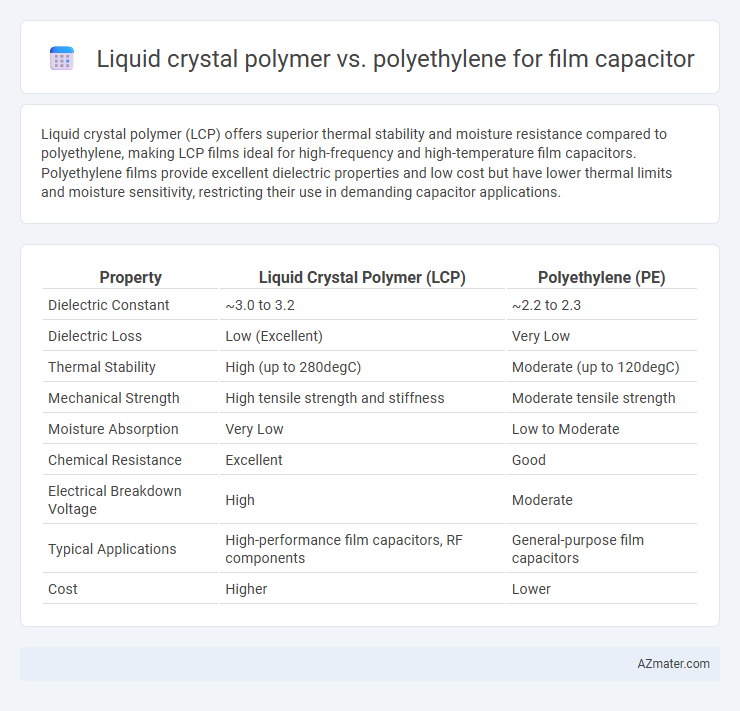Liquid crystal polymer (LCP) offers superior thermal stability and moisture resistance compared to polyethylene, making LCP films ideal for high-frequency and high-temperature film capacitors. Polyethylene films provide excellent dielectric properties and low cost but have lower thermal limits and moisture sensitivity, restricting their use in demanding capacitor applications.
Table of Comparison
| Property | Liquid Crystal Polymer (LCP) | Polyethylene (PE) |
|---|---|---|
| Dielectric Constant | ~3.0 to 3.2 | ~2.2 to 2.3 |
| Dielectric Loss | Low (Excellent) | Very Low |
| Thermal Stability | High (up to 280degC) | Moderate (up to 120degC) |
| Mechanical Strength | High tensile strength and stiffness | Moderate tensile strength |
| Moisture Absorption | Very Low | Low to Moderate |
| Chemical Resistance | Excellent | Good |
| Electrical Breakdown Voltage | High | Moderate |
| Typical Applications | High-performance film capacitors, RF components | General-purpose film capacitors |
| Cost | Higher | Lower |
Introduction to Film Capacitors
Film capacitors utilize dielectric films to store electric charge efficiently, with Liquid Crystal Polymer (LCP) and Polyethylene being popular materials due to their unique properties. Liquid Crystal Polymer offers superior thermal stability, low moisture absorption, and excellent chemical resistance, making it ideal for high-frequency and high-temperature applications. Polyethylene, known for its high dielectric strength and low dielectric loss, provides cost-effective performance but with limitations in thermal endurance compared to LCP.
Overview of Liquid Crystal Polymer (LCP)
Liquid Crystal Polymer (LCP) film capacitors exhibit exceptional thermal stability and low dielectric loss, making them ideal for high-frequency and high-temperature applications compared to Polyethylene (PE) film capacitors. LCP films offer superior mechanical strength, chemical resistance, and moisture barrier properties, ensuring enhanced reliability and longevity in harsh environments. Their anisotropic molecular structure contributes to consistent electrical performance, positioning LCP as a premium material for advanced film capacitor designs.
Characteristics of Polyethylene in Film Capacitors
Polyethylene in film capacitors exhibits excellent dielectric properties characterized by low dielectric loss and high insulation resistance, making it ideal for energy storage and voltage stability. Its chemical inertness and moisture resistance contribute to long-term reliability and performance in various environmental conditions. Compared to liquid crystal polymer, polyethylene offers superior flexibility and ease of processing, which enhances manufacturing efficiency and cost-effectiveness.
Dielectric Properties Comparison: LCP vs Polyethylene
Liquid crystal polymer (LCP) exhibits a higher dielectric constant and superior thermal stability compared to polyethylene, making it more suitable for high-performance film capacitors requiring stable capacitance under varying temperatures. LCP's low dielectric loss and excellent dimensional stability contribute to enhanced frequency response and reliability in demanding electrical applications. In contrast, polyethylene shows lower dielectric constant and higher dielectric loss, limiting its effectiveness in precision capacitors but maintaining cost-efficiency for general-purpose uses.
Thermal Stability and Performance
Liquid crystal polymer (LCP) exhibits superior thermal stability compared to polyethylene (PE), maintaining mechanical and dielectric properties at temperatures exceeding 250degC, whereas polyethylene typically degrades above 100degC. LCP's high melting point and low thermal expansion contribute to enhanced performance reliability in film capacitors used under high-temperature and high-frequency conditions. Polyethylene capacitors, while cost-effective and having low dielectric loss at lower temperatures, are limited by their lower thermal endurance, making LCP the preferred choice for demanding thermal environments.
Electrical Reliability in Capacitor Applications
Liquid crystal polymer (LCP) exhibits superior electrical reliability in film capacitor applications due to its low dielectric constant, high breakdown voltage, and excellent thermal stability compared to polyethylene (PE). LCP's molecular alignment reduces dielectric losses and prevents degradation under high-frequency stress, enhancing capacitor lifespan and performance consistency. In contrast, polyethylene films can suffer from higher leakage currents and lower resistance to voltage spikes, making LCP a preferred choice for high-reliability, high-frequency capacitor designs.
Moisture Resistance and Environmental Suitability
Liquid crystal polymer (LCP) films exhibit superior moisture resistance compared to polyethylene (PE), making them highly suitable for film capacitors exposed to humid or wet environments. LCP's low moisture absorption rate enhances dielectric stability and longevity, while polyethylene tends to absorb more moisture, risking performance degradation over time. Environmentally, LCP offers better thermal and chemical resistance, supporting applications in harsh conditions, whereas polyethylene is less durable under extreme thermal stress and chemical exposure.
Mechanical Strength and Flexibility
Liquid crystal polymer (LCP) offers superior mechanical strength compared to polyethylene, exhibiting higher tensile strength and enhanced dimensional stability under stress, making it ideal for high-performance film capacitors. In contrast, polyethylene provides greater flexibility and elongation, which benefits applications requiring bendability but compromises structural rigidity. The choice between LCP and polyethylene depends on balancing the need for mechanical robustness versus flexibility in capacitor design.
Cost-Effectiveness and Manufacturing Considerations
Liquid crystal polymer (LCP) offers superior electrical properties and thermal stability for film capacitors, but its higher raw material and processing costs often outweigh these benefits compared to polyethylene, which is more affordable and easier to manufacture. Polyethylene films enable cost-effective mass production due to their simpler extrusion and winding processes, while LCP requires specialized handling and equipment, increasing manufacturing complexity and expenses. Choosing polyethylene enhances cost-effectiveness and scalability, whereas LCP suits niche applications demanding high performance despite elevated manufacturing investment.
Application Suitability: LCP vs Polyethylene in Modern Capacitors
Liquid crystal polymer (LCP) offers superior thermal stability and low dielectric loss, making it highly suitable for high-frequency and high-temperature film capacitor applications in advanced electronics. Polyethylene films excel in low-cost, high-capacitance density designs but exhibit limited temperature resistance and higher dielectric losses under high-frequency conditions. LCP's robust mechanical properties and chemical resistance provide enhanced reliability and durability in demanding environments compared to polyethylene-based film capacitors.

Infographic: Liquid crystal polymer vs Polyethylene for Film capacitor
 azmater.com
azmater.com